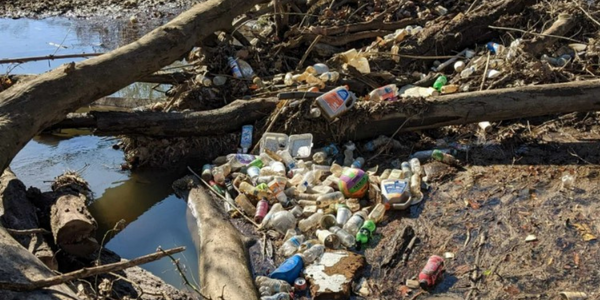
Quick Summary
- Help cleanup litter around our county.
- Clean Fairfax provides free supplies.
- Learn who to contact to report some litter cases.
- Read five tips to reduce trash/recycling night litter
Litter.
From intentional to unintentional littering, we see it across our county any time of the year. You’re the first line of defense and can help tackle litter if you’re able to.
Thousands of volunteers participate in cleanups each year in all corners of our county. Organize a community cleanup around your school, neighborhood, office building or any other area in need of beautification.
And the good news is that Clean Fairfax Council can support your effort – whether you’re an individual, community group, business, school or anyone who wants to help keep our woods, trails, roadways and elsewhere clearer.
GENERAL VOLUNTEER CLEAN UP GUIDANCE
- Drive/walk around your neighborhood, school or business community to look for sites that might work for your group.
- Be sure to contact any property owners or managers to receive permission to clean up on their land, if necessary.
- Parks: If you would like to organize or participate in a community clean-up activity at a Fairfax County park, please visit its volunteer webpage or contact FCPAVolunteers@fairfaxcounty.gov.
- VDOT Roads: Do not work on major roadways as part of an independent cleanup effort, however, learn more about VDOT’s Adopt a Highway program and consider adopting a road.
WHAT CLEAN FAIRFAX WILL PROVIDE
Clean Fairfax will provide gloves, trash bags and high-visibility vests as needed for cleanup volunteers (10 days notice needed). These supplies will be mailed to your school or nearest District Supervisor’s Office (consult this map; the red dots are district offices). Clean Fairfax also has trash grabbers that it can lend out for smaller groups, which must be picked up at Fairfax County Government Center.
Reporting Litter
It can be complicated determining who is responsible for litter clean-up, such as on a construction site, abandoned home, parks and other examples. In some cases, it’s the property owner, while for others it’s a designated county government department. In others, an agency outside of Fairfax County is responsible (e.g., the Virginia Department of Transportation is responsible for most road-side clean ups in the public right-of-way).
AFTER YOUR CLEAN UP
- Make a plan to take your trash with you and put in your business dumpster or home trash cans/dumpster to be picked up by your hauler.
- Do not leave trash bags in parks, along the side of the road, or anywhere else except in a trash can or dumpster.
- Do not call or email Clean Fairfax after your clean up telling where you left your bags.
- Following your cleanup, don’t forget to fill out a report to let Clean Fairfax know how it went.
5 TIPS FOR YOU TO REDUCE UNINTENTIONAL LITTER
One of the biggest culprits of unintentional litter is trash/recycling collection. Follow these tips to secure your waste on trash night(s):
- Keep an eye on the weather forecast, especially for windy conditions.
- Secure your trash on collection days by using containers with a lid.
- Place heavier recyclables on top of lighter materials in open recycling bins. This will prevent bottles and paper from blowing away.
- Wait to place your trash and recycling out until the morning of collection day.
- Secure trash and recycling before heavy rain events.
WATCH
Floating trash washes into Accotink Creek following a summer storm. Storm drains in Fairfax County lead directly to the nearest waterway and ultimately the Chesapeake Bay. Any litter on the ground ends up in our streams. Please help prevent litter.
ABOUT CLEAN FAIRFAX
Clean Fairfax Council began as a litter control task force in 1978, established by the Board of Supervisors to implement an anti-litter campaign. In 1985, the organization became a private nonprofit.
Funding for the program comes from statewide taxes provided by manufacturers, wholesalers and distributors of 15 product categories. As a recipient of a non-competitive state grant, Clean Fairfax Council educates residents on litter prevention and control, supports the county recycling program, promotes sustainability and provides environmental education to residents, businesses and students.



 SIGN UP FOR DAILY EMAIL HEADLINES
SIGN UP FOR DAILY EMAIL HEADLINES